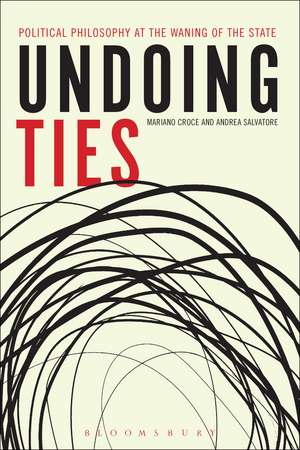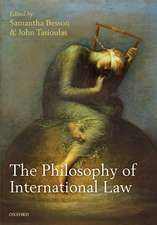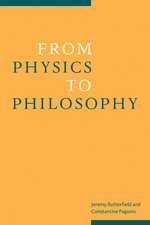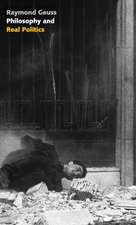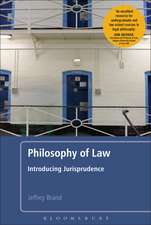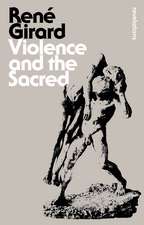Undoing Ties: Political Philosophy at the Waning of the State
Autor Mariano Croce, Andrea SalvatoreLimba Paperback – 15 iul 2015
| Toate formatele și edițiile | Preț | Express |
|---|---|---|
| Paperback (1) | 189.18 lei 3-5 săpt. | |
| Bloomsbury Publishing – 15 iul 2015 | 189.18 lei 3-5 săpt. | |
| Hardback (1) | 712.64 lei 6-8 săpt. | |
| Bloomsbury Publishing – 15 iul 2015 | 712.64 lei 6-8 săpt. |
Preț: 189.18 lei
Preț vechi: 220.89 lei
-14% Nou
Puncte Express: 284
Preț estimativ în valută:
36.20€ • 37.80$ • 29.89£
36.20€ • 37.80$ • 29.89£
Carte disponibilă
Livrare economică 25 martie-08 aprilie
Preluare comenzi: 021 569.72.76
Specificații
ISBN-13: 9781628922028
ISBN-10: 1628922028
Pagini: 192
Dimensiuni: 140 x 216 x 10 mm
Greutate: 0.23 kg
Editura: Bloomsbury Publishing
Colecția Bloomsbury Academic
Locul publicării:New York, United States
ISBN-10: 1628922028
Pagini: 192
Dimensiuni: 140 x 216 x 10 mm
Greutate: 0.23 kg
Editura: Bloomsbury Publishing
Colecția Bloomsbury Academic
Locul publicării:New York, United States
Caracteristici
First non-edited collection to explore such a wide range of poltical philosophers for the advanced undergraduate.
Notă biografică
Mariano Croce is FWO Pegasus Marie Curie Fellow at the Centre for Law and CosmopolitanValues, University of Antwerp. He has published Self-sufficiency of Law: A Critical-institutional Theory ofSocial Order (Springer, 2012) and The Legal Theory of Carl Schmitt (Routledge, 2013, with A. Salvatore).Andrea Salvatore is Post-Doctoral Research Fellow of Political Philosophy at Sapienza - University of Rome. His research interests lie in the areas of political philosophy and legal theory. He is the co-author of The Legal Theory of Carl Schmitt (Routledge 2013, with M. Croce).
Cuprins
Preface to the English editionForeword1. AFTER THE STATE1.1 Theories of government 1.1.1 New Forms of liberalism 1.1.2. Metamorphoses of government 1.1.3. The legacy of the constitution1.2. Justice and injustices 1.2.1. New paradigms of justice 1.2.2. Sovereignty in transition 2. ABOVE THE STATE2.1. Theories of globalization 2.1.1. The contraposition between national and global 2.1.2. The interpenetration between national and global2.2. Order and democracy in the global scenario 2.2.1. Cosmopolitan ideals and global democracy 2.2.2. The law of subalterns 2.2.3. Back to the state?3. WITHOUT THE STATE3.1. The twilight of the only legislator 3.1.1. Multicultural politics 3.1.2. The plurality of orders3.2. The law, the market, and the demise of politics3.2.1. Juridification or de-politicization? 3.2.2. Cultural identities vis-à-vis the market References
Recenzii
Undoing Ties by is an impressive, thorough study of an enormously profound, contemporary development that is having, and will continue to have, disruptive and politically important consequences for both politics and political philosophy.
The territorial state has been the most successful political innovation of the modern age up to the point to cover all emerged surface of the planet. But it is increasingly unable to represent the political needs of the XXI Century. In this fascinating reconstruction, Croce and Salvatore show with passion and competence how markets and civil society, individuals and ethnic groups are more and more discontent with what the state provides. And, more importantly, they indicate what alternative forms of political organization are emerging.
This book attempts to answer a pivotal question: what happens to political theory now that the ties between state and citizens are being undone? The answer, at least at first impression, is offered with remarkable modesty: an approachable and contained overview of political theory with regards to the conditions of the transition. Yet, any apparent modesty is quickly belied, first, by the ambitious interdisciplinarity of the venture, with learned insights from jurisprudence, philosophy, sociology and anthropology, and second, by the astonishing depth of original analysis contained here while never amounting to anything short of approachable. So if you thought you knew your Rawls, Sen, Beck, read this book and think again. The feat of Undoing Ties is to provide both an original overview and an elaborate new perspective on citizenship beyond the state. This is not an ordinary book of political theory but an erudite disquisition on the conditions of transition, a subtle questioning of such important issues as structural violence, cultural and legal pluralism, supranational justice, and global poverty, and an imaginative foray into what might happen next.
The territorial state has been the most successful political innovation of the modern age up to the point to cover all emerged surface of the planet. But it is increasingly unable to represent the political needs of the XXI Century. In this fascinating reconstruction, Croce and Salvatore show with passion and competence how markets and civil society, individuals and ethnic groups are more and more discontent with what the state provides. And, more importantly, they indicate what alternative forms of political organization are emerging.
This book attempts to answer a pivotal question: what happens to political theory now that the ties between state and citizens are being undone? The answer, at least at first impression, is offered with remarkable modesty: an approachable and contained overview of political theory with regards to the conditions of the transition. Yet, any apparent modesty is quickly belied, first, by the ambitious interdisciplinarity of the venture, with learned insights from jurisprudence, philosophy, sociology and anthropology, and second, by the astonishing depth of original analysis contained here while never amounting to anything short of approachable. So if you thought you knew your Rawls, Sen, Beck, read this book and think again. The feat of Undoing Ties is to provide both an original overview and an elaborate new perspective on citizenship beyond the state. This is not an ordinary book of political theory but an erudite disquisition on the conditions of transition, a subtle questioning of such important issues as structural violence, cultural and legal pluralism, supranational justice, and global poverty, and an imaginative foray into what might happen next.
